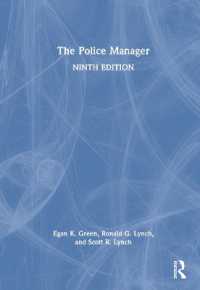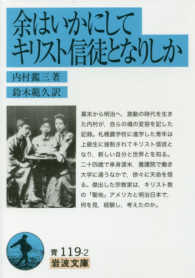- ホーム
- > 洋書
- > 英文書
- > Philosophy
Full Description
This title was first published in 2003. This book develops a moral ontology for a theistic ethic that engages the work of contemporary moral and political philosophers, and reaffirms the relevance of a theistic tradition of God's relation to the world reflected in the fundamental teachings of Judaism, Christianity and Islam. Drawing on recent thought in the non-religious fields of psychology and political and moral philosophy, which build around the concept of human flourishing in community, Kirkpatrick argues that a theistic ethic need not be the captive of parochial or sectarian theological camps. He proposes a common or universal ethic that transcends the fashionable ethnocentric 'incommensurate differences' in morality alleged by many post-modern deconstructionists. In the wake of ethnic religious strife post September 11th 2001, this book argues for a common morality built on the inclusivity of love, community, and justice that can transcend sectarian and parochial boundaries.
Contents
Contents: Preface; Introduction; The challenge of relativism and deconstruction to theistic ethics; Knowledge as relational; God as the personal 'other': acting in history; Inferring God's agency and intentions from history; Constructing an ethics of community: the theistic response to the intentions of God in history; Theistic ethics, moral philosophy, and psychology: the foundations of a conversation; Flourishing, altruism, trust, and love; Moral rules and contexts: the ethics of feminism, natural law, Marxism, and virtue; Theistic ethics and contemporary political philosophies; Summary and conclusion; Bibliography; Index.







